OAKLAND — For decades, the typical stereotype of an American barber was a kindly white-haired man with a white shirt and deft fingers, usually surrounded by the comforting aroma of hair tonic.
But with fewer iconic barber poles gracing Maine’s Main Streets, a young man who breaks the stereotypes is hoping to rekindle the appeal of barber shops to a new generation.
Sporting tattoos, loose-fitting clothes, jewelry and a baseball cap, 23-year-old Derrik Vigue doesn’t look like an old-time barber.
He can often be seen sitting on the stoop in front of Faded Lines Barber Shop, a business he opened in July on Church Street, exchanging waves with friends as they drive by.
The barber shop is next door to Fine Lines Hair Salon, where his mother and grandmother have been cutting hair together for nearly 25 years.
After Vigue’s early interest in a career as a motorcycle repairman didn’t pan out, even while working in a retail sales job he didn’t love, he never thought he’d become a third-generation hair cutter.
He had a hard time picturing himself entering a profession that, in his experience, was dominated by either women or men over the age of 50.
He changed his mind after a visit to Boston, where he saw a busy barbershop full of vibrant energy, slick as a pompadour and stylish as a Hollywood hipster.
As he watched the suave young barbers cutting hair to the beat of popular music, Vigue saw that, amid a general decline of licensed barbers in Maine, there might be an opportunity for a new kind of barber to emerge and serve people like Vigue — young men who care about their appearance but don’t feel a cultural connection to the traditional community barbershop.
Barbers fading
It’s a new idea in a profession where most of the faces are well-worn.
“We’re sort of like dinosaurs,” said Freeman Buzzell, 72, and known to his customers as Buzzy. He’s operated Buzzy’s Barber Shop in Madison for 53 years. “When I started here in the early ’60s, there were five barbers here. I’m the only one left.”
It would be easier to count the hairs on Vigue’s carefully sculpted head than the haircuts Buzzell has given over the years.
When Buzzell first opened his door, barbershops were a cultural necessity.
Back then, he said, men stayed away from hair salons in droves, worried their masculinity would be tainted by the feminine aura.
The aversion was so strong, he said, that if a man was picking his wife up from a beauty parlor, “you couldn’t pay him enough to go inside.”
These days, the gender barriers no longer apply, and hair salons are everywhere, he said. Most, including Fine Lines, count many men among their clients.
Buzzell and others in the industry said barbers have also lost ground to chains like Supercuts and Walmart’s SmartStyle, which attract a lot of male customers.
In the meantime, after a lifetime of sweeping hair, Maine’s barbers are themselves being swept from their shops by the forces of time and age.
According to state records, there were 707 licensed barbers in the state in 2001. The number has has dropped every year since, to 444 in 2012, a decline of 37 percent.
In the last few years alone, a number of community barbers, beloved for their colorful names and personalities, have given their final shave, according to Morning Sentinel archives.
In 2010, Waterville lost 85-year-old “Al the Barber,” World War II veteran Alcide Fecteau; in 2011, 72-year-old Augusta barber Albenie Dufour, and Fairfield’s Jeff “the Barber” Williams, who ran his shop for 41 years, both died.
Last year, Pop Hall, a former state trooper-turned barber in Skowhegan, died at 80, and Lorette’s Barber Shop closed in Winthrop after 76-year-old Francis Lorette decided that 50 years in the business was enough.
The average age of a working, licensed barber in Maine was 58 in 2011, and is likely to have gone up to 59 or 60 by now, according to Doug Dunbar, legislative liaison for Maine’s Office of Professional and Occupational Regulation.
If the trend continues at the same rate, within 20 years, Maine’s last barber will have clipped the hair of his last client before disappearing into a cloud of hair tonic and nostalgia.
Buzzell has considered retiring, he said, but he’d miss his customers too much.
He is a living repository of the lore that only an old barber, it seems, would remember.
For example, he knows a thing or two about hair, having shorn enough of it to fill his own shop with clippings many times over.
Buzzell gives bags of the stuff away to farmers and gardeners, who hang it in nets, he said, because when the wind blows through, it keeps the raccoons out of the corn.
Hair was also mixed into plaster in the old days, before Buzzell got into barbering.
Back then, the red and white of a barber pole advertised blood and bandages — a symbol of the days when barbers would not only deliver a trim and a shave, but also pull teeth and perform the once-common medical practice of draining blood with leeches.
A foot in the door
One reason for the decline of Maine’s barbers is that until recently, there were no barber courses offered in the state. An aspiring barber could either go to an out-of-state school or apprentice to a barber for an intimidating 2,000 hours.
With few new barbers being trained, barber shops struggled to find workers, said to Tony Coco, owner of the Capilo Institute, an Augusta-based cosmetology school.
Coco said he once fielded a call from a retiring barber looking for an up-and-comer — he wanted to retire and give his barbershop away.
But without any student barbers enrolled, Coco could offer the man no help.
In order to boost the number of barbers in Maine, the Legislature in 2011 approved a bill, put forward by the state professional regulation department, for a limited barbering license, which separates the services a barber is most called upon to perform — cutting and shaving— from services such as perms and hair coloring.
Under the law, barber students must spend 20 hours on toupees, 65 hours on equipment sterilization and 275 hours on the basic principles of haircutting — part of an 800-hour total course.
The law prompted Coco to offer the state’s first barber course in 17 years.
For about $10,000, and six and a half months of study, Coco said, a student can earn a limited barber’s license, helping to fill the void left behind by those leaving the profession.
Vigue is one of seven newly licensed barbers who have gone through the school. Four more are attending, and the next class is slated to begin Nov. 5.
A new style
A new barber can’t coast on old traditions because, Coco said, there are two distinct markets.
“There’s the traditional type of barber. They’re hunters. They fish,” he said. “Then I’ve got, like Derrik, the trendy guys. They’re looking for the New York, Boston, hip type of men’s shop where guys can come hang out and keep up with the latest styles.”
In keeping with the 21st century vibe, Vigue doesn’t yet have a sign on his shop, but he does have a large request on the door to like him on Facebook and an active Facebook page.
Coco said youth culture barbering has begun to emerge in Portland and will spread through the state over time.
Right now, not enough young men seek trendy haircuts to support Vigue’s shop, and so he tries to include traditional clients while maintaining a youthful edge.
His shop features items both old and new — a poster of the movie “Barbershop,” starring Ice Cube, faces a display case with antiquated hair-clippers and straight razors, used by a funeral home that was once on the site to deliver final haircuts and shaves to the departed.
His products include Lucky Tiger, a hair tonic so popular in the ’50s that its fragrance has become an integral part of the authentic barbershop experience.
“It gives it that barbershop smell,” Vigue said.
The shop also has a television tuned to sports coverage, which he said helps to break the ice with clients that seem nervous about sitting in the chair of a tattooed 23-year-old.
“Some old people think, ‘oh, he’s just a punk,'” but after a minute or two of conversation, he said, they warm up.
On Friday afternoon, William Cook, a white-haired Oakland resident was driving by Vigue’s shop when the new barber pole caught his eye. He came inside and sat in Vigue’s chair for the first time.
When he got his first look at the young barber, “I wanted to run in the other direction,” he joked.
“No, I’m kidding,” he said. “It didn’t bother me. And he did just fine. I would definitely come back.”
In order to maintain his edge, Vigue studies online tutorials of the latest techniques, popular in the cities, but rarely requested by his clients.
A fade, he said, describes a transition from bare skin to full growth without a line showing, while a shape-up is a well-defined, short-trimmed sideburn, individualized with curves or squared edges.
“Around here, nobody even knows what that is,” Vigue said.
He practices these skills on his friends, hoping others will see and want his services, too.
Some of the hippest hair styles are from the ’40s and ’50s, and so he is training himself to give modern versions of a slicked-back pompadour and a hard part.
As much as Vigue wants to be the bold trendsetter ushering in a new age of barbering, he is also getting an education about traditional family businesses.
Many of his clients, referrals from Vigue’s mother and grandmother, have memories of Vigue as a small child in the corner of his mother’s salon, memories that predate his own. They know him — in some ways, perhaps, better than he knows himself.
It’s a good feeling.
“I guess I didn’t understand the community of it,” he said.
For Vigue, a young man who wants to change the world of barbering, his own world is changing, sometimes in subtle ways.
Vigue still sits on the stoop outside his shop, exchanging waves with friends in cars. These days, though, the hair on the heads of most of those who wave, he said, is white.
Matt Hongoltz-Hetling — 861-9287
mhhetling@mainetoday.com
Send questions/comments to the editors.

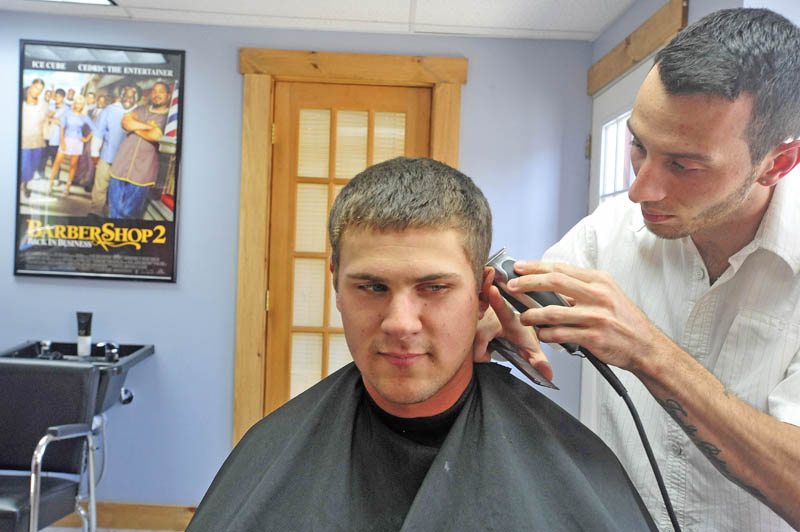
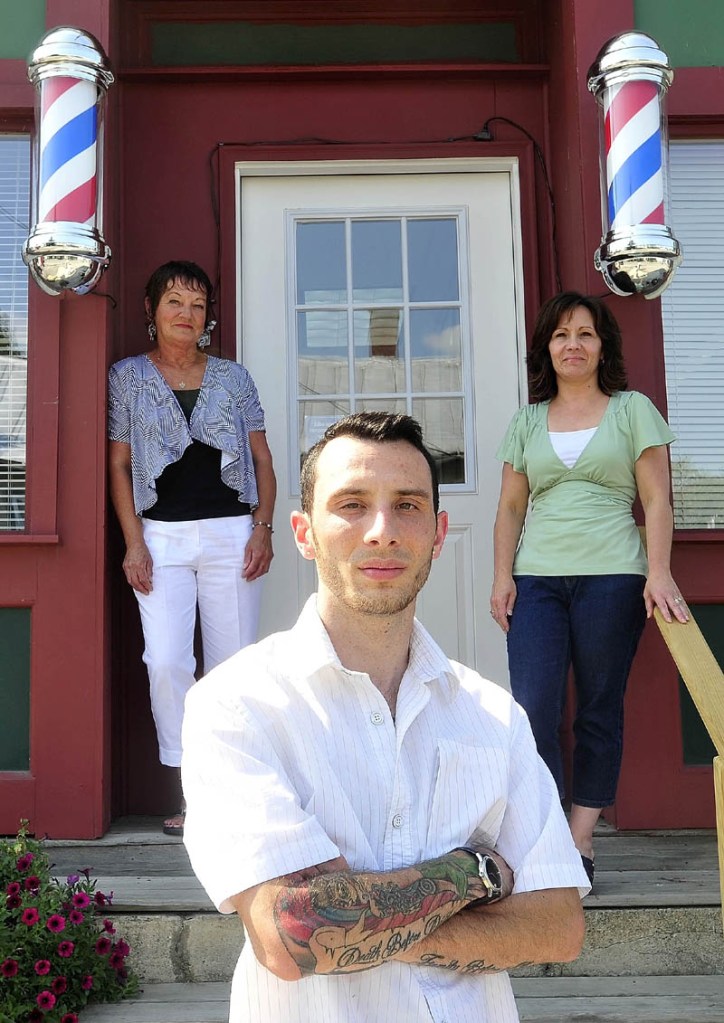
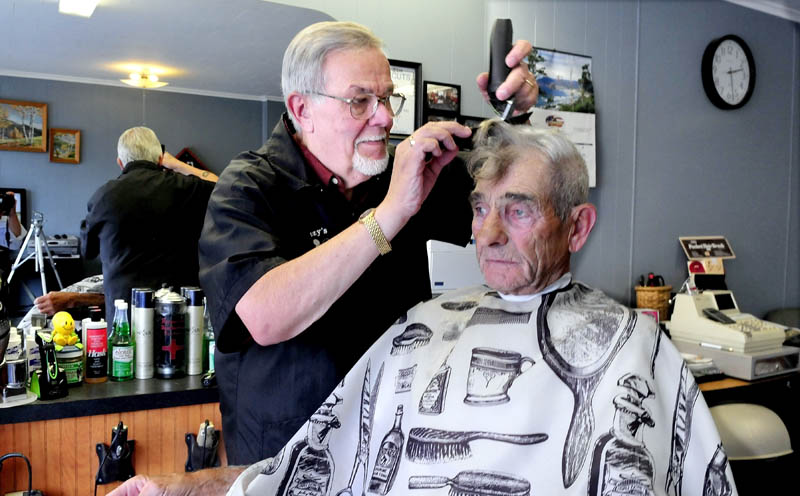
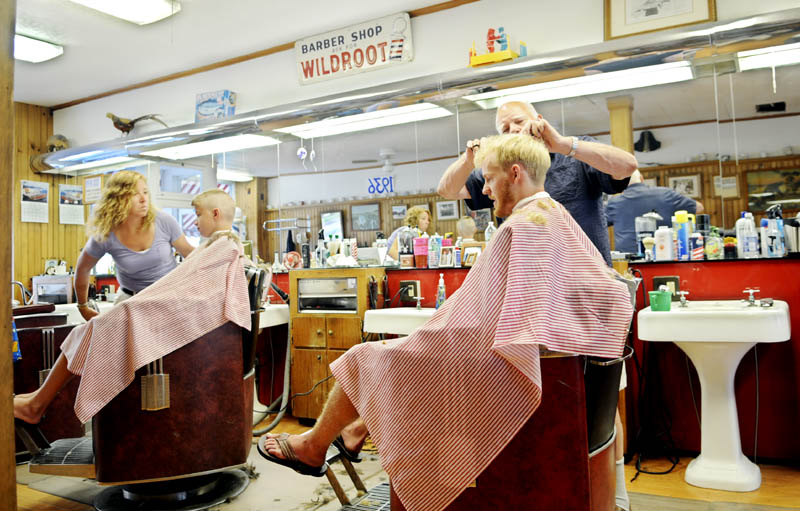
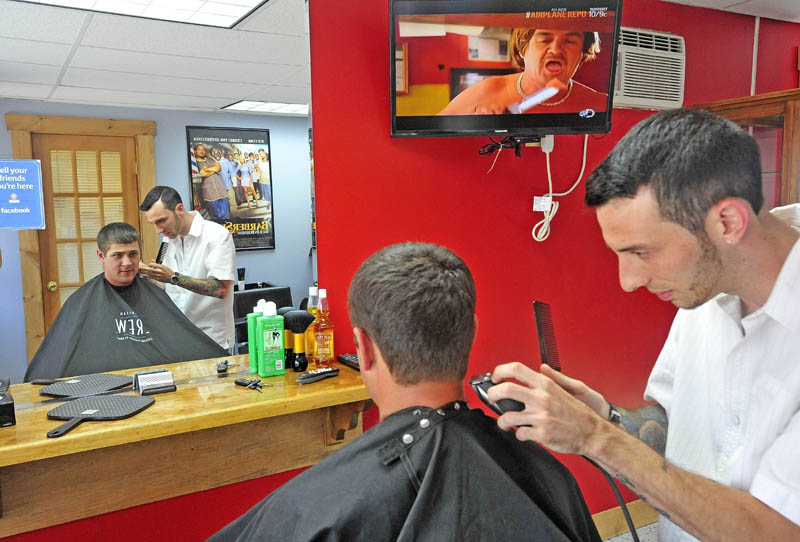
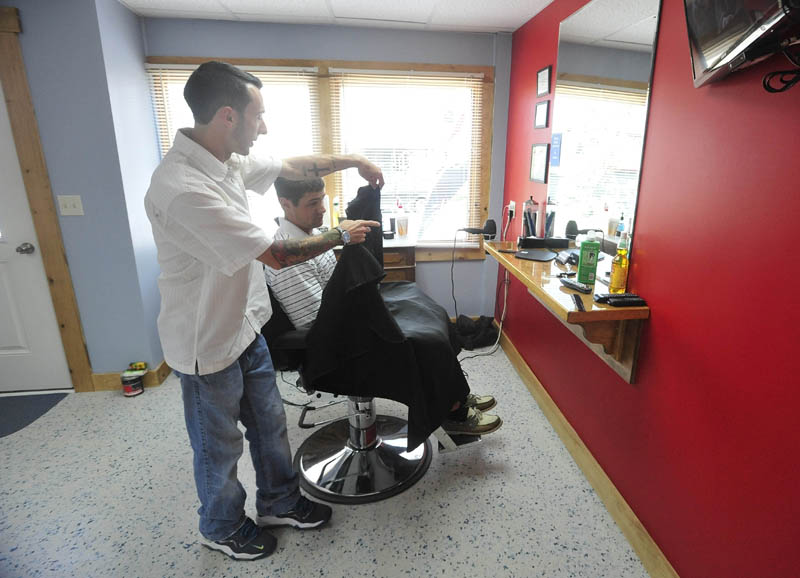
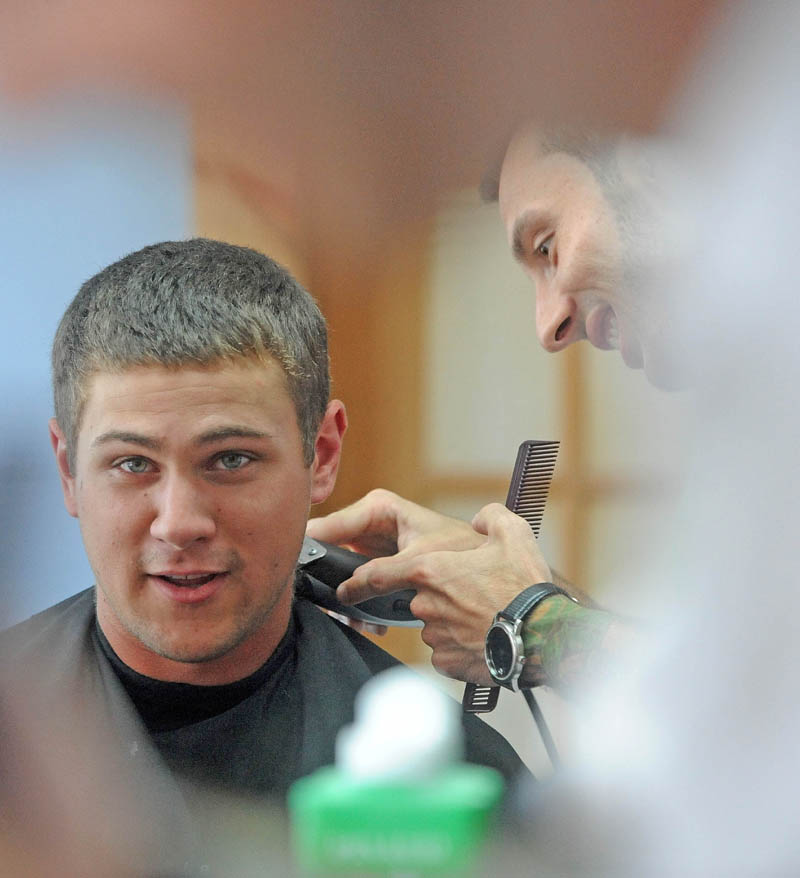
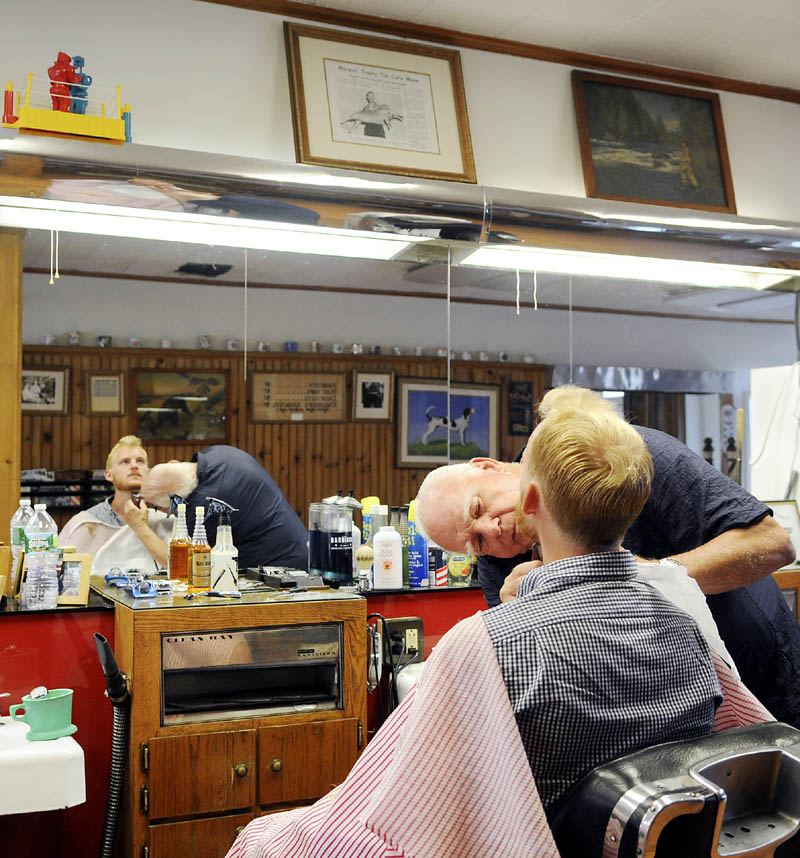

Success. Please wait for the page to reload. If the page does not reload within 5 seconds, please refresh the page.
Enter your email and password to access comments.
Hi, to comment on stories you must . This profile is in addition to your subscription and website login.
Already have a commenting profile? .
Invalid username/password.
Please check your email to confirm and complete your registration.
Only subscribers are eligible to post comments. Please subscribe or login first for digital access. Here’s why.
Use the form below to reset your password. When you've submitted your account email, we will send an email with a reset code.